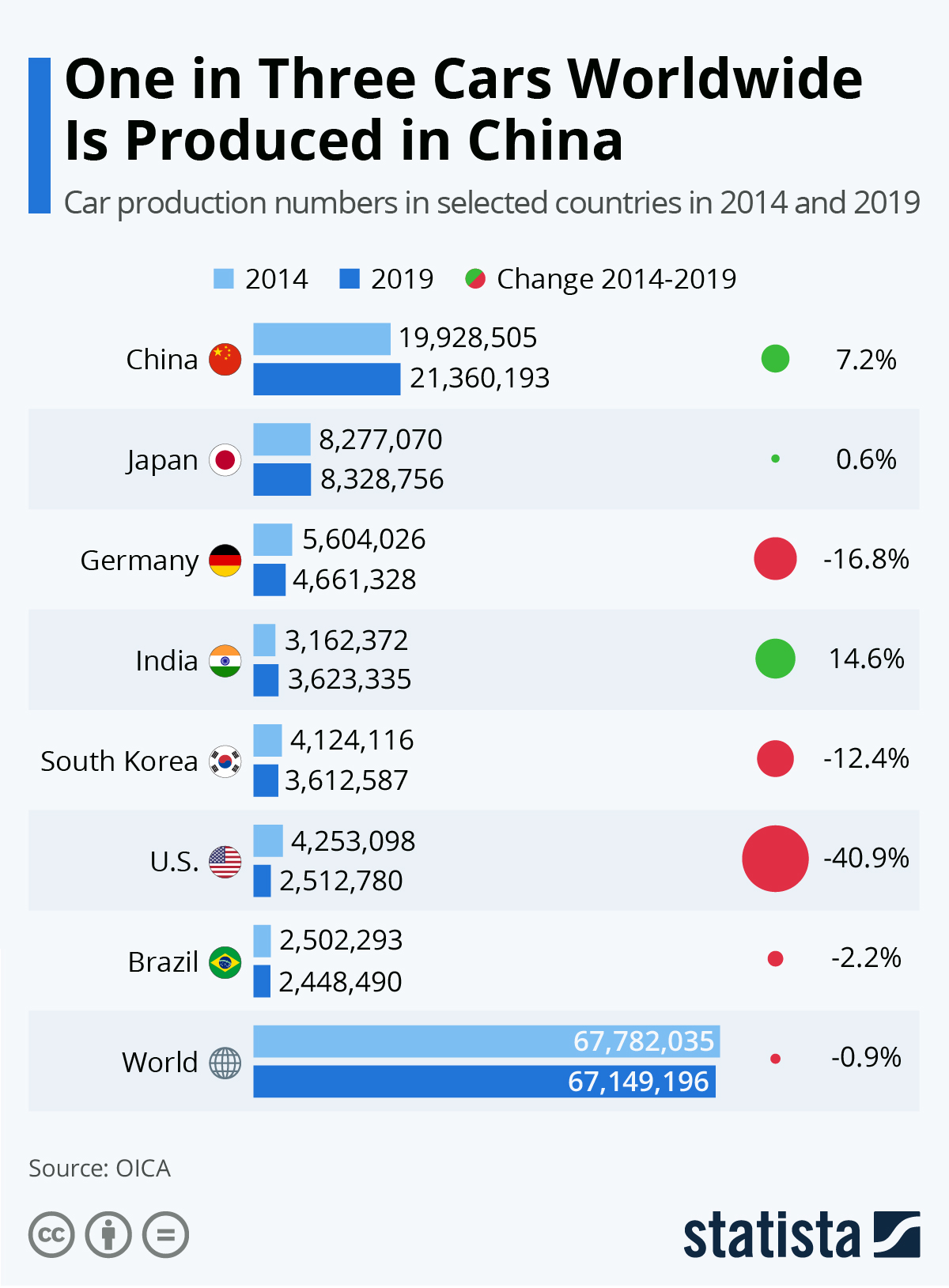China's Auto Market: A Critical Analysis Of Foreign Brand Performance

Table of Contents
The Competitive Landscape of China's Automotive Industry
The Chinese automotive industry is a complex ecosystem characterized by intense competition and rapid innovation. Domestic brands like Geely, BYD, and Great Wall Motors have significantly increased their market share, posing a significant threat to established foreign players. This growth is fueled by advancements in technology, particularly in electric vehicles (EVs), and a growing preference among Chinese consumers for domestically produced vehicles that often offer competitive pricing and features tailored to local preferences.
The market is segmented into various categories, targeting diverse consumer groups with varying budgets and preferences. From luxury sedans to budget-friendly hatchbacks and the burgeoning EV sector, foreign brands face a diverse and sophisticated market. Key players include not only the aforementioned domestic giants but also international automakers like Volkswagen, Toyota, BMW, and Mercedes-Benz, each vying for a piece of the market.
- Growth of electric vehicles (EVs) and its impact on foreign brands: The rapid expansion of the EV market in China presents both opportunities and challenges. Foreign brands need to adapt quickly to compete with domestic EV manufacturers who often enjoy government subsidies and strong brand recognition.
- Government policies and their influence on the market: Government regulations, including emission standards, fuel efficiency requirements, and incentives for domestic brands, significantly shape the competitive landscape. Navigating these policies is crucial for foreign brands' success.
- Rising consumer preference for domestic brands and technological advancements: Chinese consumers are increasingly impressed by the quality, technology, and features offered by domestic brands, especially in the EV sector. This shift in preference necessitates a strategic response from foreign automakers.
- Challenges posed by local brands’ cost-effectiveness and tailored offerings: Domestic brands often offer vehicles at lower price points, incorporating features specifically designed to appeal to Chinese consumer tastes. This cost-effectiveness poses a direct challenge to many foreign brands' pricing strategies.
Localization Strategies: Key to Success or a Necessary Evil?
Localization is not merely an option but a necessity for foreign brands seeking success in China. Adapting products and marketing strategies to the unique characteristics of the Chinese market is crucial. Successful localization involves understanding cultural nuances, consumer preferences, and adapting manufacturing and supply chains accordingly.
For example, some foreign brands have successfully localized their products by incorporating features specifically desired by Chinese consumers, such as larger infotainment screens, advanced driver-assistance systems (ADAS), and unique design elements reflecting Chinese aesthetics. Conversely, brands that failed to adapt their offerings to local tastes have struggled to gain market share.
- Importance of understanding Chinese consumer preferences and cultural nuances: Marketing campaigns must be culturally sensitive and resonate with the values and aspirations of the target audience.
- Challenges in adapting manufacturing processes and supply chains: Establishing efficient and reliable supply chains within China is essential to compete on price and ensure timely delivery.
- The role of joint ventures in achieving localization: Joint ventures with local partners often provide access to valuable knowledge, distribution networks, and regulatory expertise.
- Impact of localization on brand image and customer loyalty: Successful localization can enhance brand image, fostering trust and loyalty among Chinese consumers.
Pricing and Distribution Strategies in the Chinese Market
Pricing strategies are a critical element of success in China's competitive automotive market. Balancing profitability with competitiveness requires careful consideration of production costs, import tariffs, taxes, and consumer price sensitivity. Efficient distribution networks, including robust dealership networks and online sales platforms, are equally vital for reaching target consumers.
- The impact of import tariffs and taxes on pricing: High import tariffs and taxes can significantly increase the final price of imported vehicles, making them less competitive compared to locally produced alternatives.
- The role of online sales and e-commerce platforms: Leveraging online sales channels is increasingly important in China, given the rising popularity of e-commerce and the prevalence of online reviews and ratings.
- Comparison of pricing strategies of successful vs. unsuccessful brands: Successful foreign brands have often adopted competitive pricing strategies, sometimes sacrificing short-term profit margins to gain market share.
- Analysis of dealership networks and their effectiveness: A well-established and efficient dealership network is crucial for providing after-sales service and building customer relationships.
Branding and Marketing: Building Trust in the Chinese Market
Building a strong brand image and fostering trust are paramount for foreign automakers in China. Effective marketing campaigns are essential for creating brand awareness, communicating product benefits, and cultivating positive brand perception. This involves understanding the power of social media, celebrity endorsements, and adapting messaging to resonate with Chinese cultural values.
- The influence of celebrity endorsements: Celebrity endorsements can be highly effective in China, but careful selection of celebrities aligned with the brand's image is crucial.
- The effectiveness of different marketing channels in China: A multi-channel approach, utilizing digital marketing, social media, and traditional media, is often necessary to reach a diverse audience.
- The need for culturally sensitive marketing communications: Marketing materials must reflect an understanding of Chinese cultural values and avoid any potential cultural missteps.
- Challenges in managing brand reputation in the digital age: Negative online reviews or social media posts can quickly damage a brand’s reputation in China, requiring proactive reputation management strategies.
Conclusion: The Future of Foreign Brands in China's Booming Auto Market
Foreign brands face both significant challenges and remarkable opportunities in China's dynamic automotive market. Success hinges on adapting to the rapidly evolving landscape by implementing effective localization strategies, carefully calibrated pricing strategies, and robust branding and marketing efforts. The growth of domestic brands, the expansion of the EV sector, and evolving consumer preferences all necessitate a proactive and flexible approach. Understanding the nuances of China's auto market is crucial for foreign brands seeking success. Further research into specific localization strategies and branding approaches is essential for navigating this competitive landscape. Keywords: China automotive market analysis, foreign auto brands strategy, successful marketing in China, future of the Chinese auto industry.

Featured Posts
-
 Euro 2025 Three Critical Questions For Englands Wiegman
May 02, 2025
Euro 2025 Three Critical Questions For Englands Wiegman
May 02, 2025 -
 Aventure De 8 000 Km Le Recit De Trois Jeunes Ornais
May 02, 2025
Aventure De 8 000 Km Le Recit De Trois Jeunes Ornais
May 02, 2025 -
 Switzerlands President Calls For Peace Amidst Russian Aggression In Ukraine
May 02, 2025
Switzerlands President Calls For Peace Amidst Russian Aggression In Ukraine
May 02, 2025 -
 Boulangerie Normande Un Poids De Chocolat Pour Le Premier Bebe De L Annee
May 02, 2025
Boulangerie Normande Un Poids De Chocolat Pour Le Premier Bebe De L Annee
May 02, 2025 -
 Israil Meclisi Esir Ailelerinin Protestosu Ve Guevenlik Guecleriyle Olan Kavga
May 02, 2025
Israil Meclisi Esir Ailelerinin Protestosu Ve Guevenlik Guecleriyle Olan Kavga
May 02, 2025
Latest Posts
-
 Infuriating Glastonbury Stage Time Clashes Fan Reactions
May 02, 2025
Infuriating Glastonbury Stage Time Clashes Fan Reactions
May 02, 2025 -
 Dublin Concert Loyle Carner At The 3 Arena
May 02, 2025
Dublin Concert Loyle Carner At The 3 Arena
May 02, 2025 -
 Glastonbury 2024 Scheduling Conflicts Spark Fan Anger
May 02, 2025
Glastonbury 2024 Scheduling Conflicts Spark Fan Anger
May 02, 2025 -
 Loyle Carner To Play Dublins 3 Arena
May 02, 2025
Loyle Carner To Play Dublins 3 Arena
May 02, 2025 -
 Glastonbury Festival Fans Outraged By Conflicting Stage Performances
May 02, 2025
Glastonbury Festival Fans Outraged By Conflicting Stage Performances
May 02, 2025
